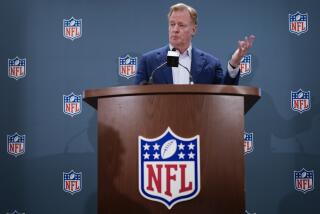Apple e-book price-fixing trial about to get underway
For a company that beat down prices of online music, Apple Inc. finds itself in the odd situation of defending itself against government claims that it conspired to fix prices for electronic books.
Starting Monday, the Justice Department will lay out in a civil antitrust trial its accusations that Apple masterminded a cartel with publishers to raise prices in an e-book market in which the Cupertino, Calif., company remains a bit player compared with rival Amazon.com Inc.
As opening statements begin, perhaps the biggest question hovering over the proceedings is this: Why is this case even going to trial?
All the publishers who allegedly worked with Apple have settled, meaning that no matter the outcome of the trial, Apple already is effectively blocked from doing the things the Justice Department wants it to stop doing.
And before anyone even sets foot in the courtroom, the judge already has indicated that Apple doesn’t have much of a chance of winning.
Still, both sides have determined that this case is one that needs to be aired in a public courtroom, if for no other reason than to thrash out competing principles.
“The e-book case is bizarre,” Apple Chief Executive Tim Cook said this week at the All Things D conference. “We’re not going to sign a settlement that says we did something we didn’t do. So we’re going to fight.”
David Balto, an antitrust lawyer and former policy director of the Bureau of Competition at the Federal Trade Commission, said that by continuing to fight, Apple’s real risk is to its public image.
“They’re being accused of being a cartel ringmaster and using their size to bring these other companies in line,” Balto said. “Apple has invested a lot to create a reputation that it is pro-consumer. But there could be a lot that comes out at this trial that hurts that image.”
The trial in U.S. District Court in Manhattan, which is expected to last up to three weeks, grew out of Apple’s splashy entrance into the e-book market in 2010.
The company was preparing to unveil the first iPad and believed it had a gadget that could disrupt the budding e-book market that had been dominated by Amazon and its Kindle Reader, much the way the iPod and the iTunes store disrupted the music business.
Apple co-founder Steve Jobs persuaded five major publishers — Penguin, HarperCollins, Simon & Schuster, Macmillan and Hachette Book Group — to sign onto its new iBookstore using a different pricing model than the $9.99 flat rate charged by Amazon.
Publishers joined with Apple because they wanted more control over pricing for different books than Amazon offered.
But, according to the Justice Department, the real intent of Apple’s deal with publishers was to drive up prices.
To make its case, the government is planning to use a series of Jobs’ emails as evidence of collusion. For instance, in an email to James Murdoch of News Corp., which owns HarperCollins, Jobs argued that the new iPad would sell more units in a few weeks than the total number of Kindles Amazon had sold.
Jobs wrote: “Throw in with Apple and see if we can all make a go of this to create a real mainstream ebooks market at $12.99 and $14.99.”
Apple has argued in filings that these and other emails have been taken out of context. The company and its lawyers also have countered that Apple’s entry into the market has provided more competition and innovation, noting that other companies have significantly improved their e-readers by introducing color screens and apps.
Apple and government lawyers declined to comment for this story.
The Justice Department initially brought its case against Apple and the five publishers. But in recent months, each of the publishers has settled. They’ve agreed to give e-book retailers the option to sell their books at discounts to compensate consumers for any inflation in e-book prices that occurred as a result of their deals with Apple.
Only Apple is left standing, and its chances of winning appear slim. It wasn’t known yet whether any publisher would testify for the government.
Asked during a preliminary hearing in May about the case, Judge Denise Cote indicated that the government’s case is a strong one. Given that there is no jury, her remarks have been interpreted by many to mean that Apple may already have lost the case.
“I believe that the government will be able to show at trial direct evidence that Apple knowingly participated in and facilitated a conspiracy to raise prices of e-books, and that the circumstantial evidence in this case, including the terms of the agreements, will confirm that,” Cote said.
Since Apple launched the iBookstore and iPad, the global e-book market has soared to about $14.9 billion this year from $1.6 billion three years ago, Forrester Research said. E-books now account for 9% of books sold, up from 1% in 2010.
Amazon controls about 65% of e-book market while Apple has about 10%.
“Whatever happens at the trial won’t affect their revenues very much,” said Sarah Rotman Epps, a Forrester analyst.
More to Read
Inside the business of entertainment
The Wide Shot brings you news, analysis and insights on everything from streaming wars to production — and what it all means for the future.
You may occasionally receive promotional content from the Los Angeles Times.











